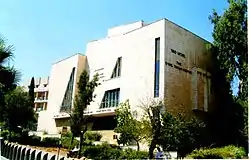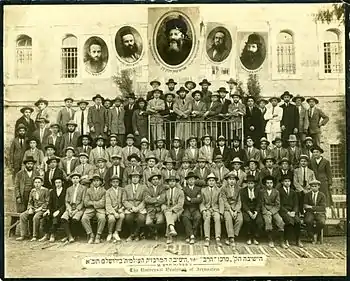Mercaz HaRav
Mercaz HaRav (officially, Hebrew: מרכז הרב - הישיבה המרכזית העולמית,[1] "The Center of Rabbi [Kook] - the Central Universal Yeshiva")[2] is a national-religious yeshiva in Jerusalem, founded in 1924 by Ashkenazi Chief Rabbi Abraham Isaac Kook.[3][4] Located in the city's Kiryat Moshe neighborhood, it has become the most prominent religious-Zionist yeshiva in the world and synonymous with Rabbi Kook's teachings.[5] Many Religious Zionist educators and leaders have studied at Mercaz HaRav.[5]

Name
.JPG.webp)
The yeshiva’s official name is The Central Universal Yeshiva, indicating its role in Kook’s vision for the spiritual revitalization of the Jewish people. Kook, however, lacked the financial backing necessary to establish a full-fledged academic institution. He initiated its modest beginning as a small collection (or center, Mercaz) of scholars associated with HaRav - the chief rabbi of Eretz Yisrael. The name "Mercaz HaRav" remained, despite the yeshiva’s transformation over the years into one of Israel's largest and most influential yeshivot.[6]
History

Mercaz HaRav was founded in 1924 by Rabbi Abraham Isaac Kook, the chief Ashkenazi rabbi during the British Mandate. It was housed in Beit HaRav, built by the noted American philanthropist Harry Fischel. Rabbi Kook's vision was to create a new yeshiva curriculum, integrating traditional Talmudic studies with Jewish philosophy, Bible, Jewish history, geography, and literature. The last three subjects, however, were never taught there.[5]
In 1925, Rabbi Kook invited the great European scholar Rabbi Avraham Aharon Borstein (1867–1925) to serve as rosh yeshiva. Tragically, Rabbi Borstein died suddenly at age 58, nine months after taking up his duties.[7]
Kook died in 1935, and his student, Rabbi Yaakov Moshe Charlap, succeeded him as rosh yeshiva.[8] After Charlap's death in 1951, Rabbi Zvi Yehuda Kook, Rabbi Abraham Isaac Kook's son, took up his father's position. In 1982, after Rabbi Zvi Yehuda Kook died, Rabbi Avraham Shapira took the position and led the institution until his death in 2007. His son Rabbi Yaakov Shapira is his successor.
In its first decades, the yeshiva had few students; at times it was not clear whether it would survive. The turning point came in the '50s, when graduates of Bnei Akiva religious schools and high-school yeshivas seeking higher religious education flocked to Mercaz Harav, the only Zionist yeshiva. Bnei Akiva leader Rabbi Moshe Zvi Neria, a disciple of Rabbi Abraham Isaac Kook, encouraged students to go to Mercaz Harav, then headed by Rabbi Zvi Yehuda Kook.[5]
In 1997, Rabbi Zvi Thau strongly opposed the introduction of an academic framework - plans to integrate a teaching institute - into Mercaz HaRav. As a result of the disagreement, he, together with six senior lecturers and many students, left the yeshiva and established the Har Hamor yeshiva.[9]
Today, the yeshiva has about 500 students, including 200 students in the yeshiva's kollel (post-graduate division).[5]
Roshei Yeshiva
- Abraham Isaac Kook, (1924-1935)
- Avraham Aharon Borstein, (1925)
- Yaakov Moshe Charlap, (1935-1951)
- Natan Ra'anan, (lecturer and administrator)(1935-1972)[10]
- Tzvi Yehuda Kook, (1951-1982)
- Shaul Yisraeli, (1982-1995)
- Avraham Shapira, (1982-2007)
- Yaakov Shapira, (2007 to present)
Mercaz HaRav massacre
On the night of March 6, 2008, an Arab from Jabel Mukaber in East Jerusalem, entered the yeshiva with a gun and began firing indiscriminately, killing eight students and wounding 15 others. The terrorist's bloody rampage ended with the arrival of Yitzhak Dadon, a part-time student of the yeshiva, and David Shapira, an officer in the Israel Defense Forces, who shot him to death.
Victims
| Name | Age | From | Studied at |
|---|---|---|---|
| Neria Cohen | 15 | Jerusalem | Yashlatz |
| Segev Pniel Avihail | 15 | Neve Daniel | Yashlatz |
| Avraham David Moses | 16 | Efrat | Yashlatz |
| Yehonatan Yitzhak Eldar | 16 | Shilo | Yashlatz |
| Ro'i Roth | 18 | Elkana | Mercaz Harav |
| Yohai Lipshitz | 18 | Jerusalem | Yashlatz |
| Yonadav Chaim Hirshfeld | 18 | Kokhav HaShahar | Mercaz Harav |
| Doron Mahareta | 26 | Ashdod | Mercaz Harav |
Notable alumni

The list includes a number of Knesset members, rabbis, and community leaders.[11]
- Roni Alsheikh, head of the Israel Police
- Rabbi Yaakov Ariel, Chief Rabbi of Ramat Gan
- Rabbi Shlomo Aviner, Rosh Yeshiva of Ateret Yerushalayim yeshiva, rabbi of Bet El[5]
- Rabbi David Bar-Hayim[12][13]
- Michael Ben-Ari, Knesset member
- Yoel Bin-Nun, one of the founders of Yeshivat Har Etzion
- Ezriel Carlebach, founder of the Maariv newspaper
- Rabbi Oury Amos Cherki, lecturer and author
- Rabbi Zephaniah Drori, Chief Rabbi of Kiryat Shmona
- Rabbi Haim Druckman,[5] former Knesset member, Rosh Yeshiva of Ohr Etzion Yeshiva
- Rabbi Shmuel Eliyahu, Chief Rabbi of Safed
- Rabbi Menachem Froman, founding member of Gush Emunim and former rabbi of Tekoa
- Daniel Hershkowitz (born 1953), politician, mathematician, rabbi, and president of Bar-Ilan University
- Hillel Kook, Knesset member[14]
- Rabbi Dov Lior, former Chief Rabbi of Hebron and Kiryat Arba
- Moshe Levinger, founder of post-1967 Hebron Jewish community
- Rabbi Eliezer Melamed, rabbi of Har Bracha
- Rabbi Zalman Baruch Melamed, Rosh Yeshiva of Beit El yeshiva
- Rabbi Moshe-Zvi Neria, educator, former Knesset member, Rosh Yeshiva of yeshiva in Kfar Haroeh
- Hanan Porat, educator and Knesset member
- David Raziel, commander of the Irgun
- Rabbi Haim Sabato, Rosh Yeshiva of Yeshivat Birkat Moshe and author
- Rabbi David Samson, educator
- Rabbi Yitzchak Sheilat, Rosh Yeshiva at Yeshivat Birkat Moshe and Maimonides scholar
- Rabbi Zvi Thau, co-founder and president of Yeshivat Har Hamor
- Michel Warschawski (aka Mikado), left-wing activist and author; co-founder of the Alternative Information Center[15]
- Rabbi Shaul Yisraeli, rabbi of Kfar Haroeh, Rosh Yeshiva at Mercaz HaRav, President of the Eretz Hemdah Institute
References
- "Yeshivat Mercaz HaRav Israeli Site". Yeshivat Mercaz Harav.
- "Central Universal Yeshiva Merkaz Harav". Virtual Judaica.
- "About Yeshivat Mercaz HaRav". Friends of Mercaz Harav.
- "About the Yeshiva" (in Hebrew). Mercaz Harav.
- Sheleg, Yair (March 7, 2008). "Mercaz Harav - the flagship of national-religious yeshivas". haaretz.
- Morrison, Chanan (2006). Gold from the Land of Israel: A New Light on the Weekly Torah Portion - From the Writings of Rabbi Abraham Isaac HaKohen Kook'. Urim Publications. p. 13. ISBN 965-7108-92-6.
- "ןייטשרוב ןורהא םהרבא ברה גירווטמ ברה". www.mercazharav.org. Retrieved 21 August 2018.
- Katz, Steven T. (2005). The Impact of the Holocaust on Jewish Theology. p. 118.
- "והיו עיניך רואות את מוריך". Kipa.co.il. Retrieved 3 September 2018.
- Rabbi Natan Ra'anan (Hebrew article)
- The national-religious camp's flagship yeshiva Haaretz, 8 March 2008
- http://www.forward.com/articles/104483/
- http://www.haaretz.com/weekend/anglo-file/efrat-rabbi-tilts-against-passover-food-restrictions-for-ashkenazi-jews-1.356076
- Staff. (24 August 2001) "Obituaries: Hillel Kook", Telegraph
- On the Border: Memoir of a Militant Jew, 2005.
External links
| Wikimedia Commons has media related to Mercaz HaRav. |
- Official website (in English)
- Official website (in Hebrew)